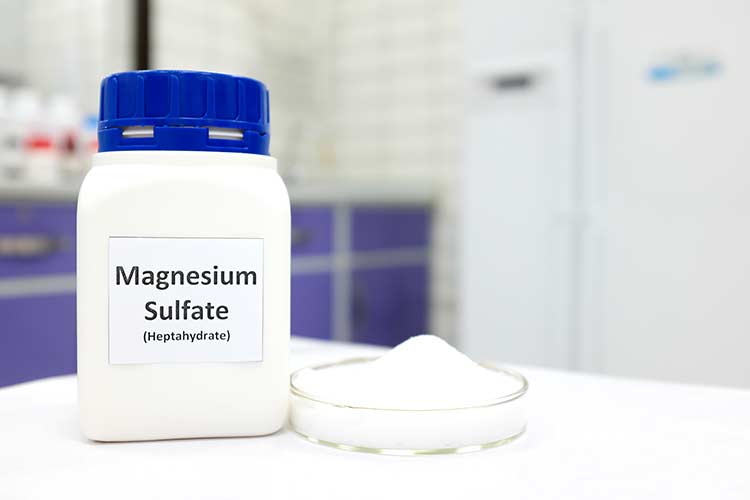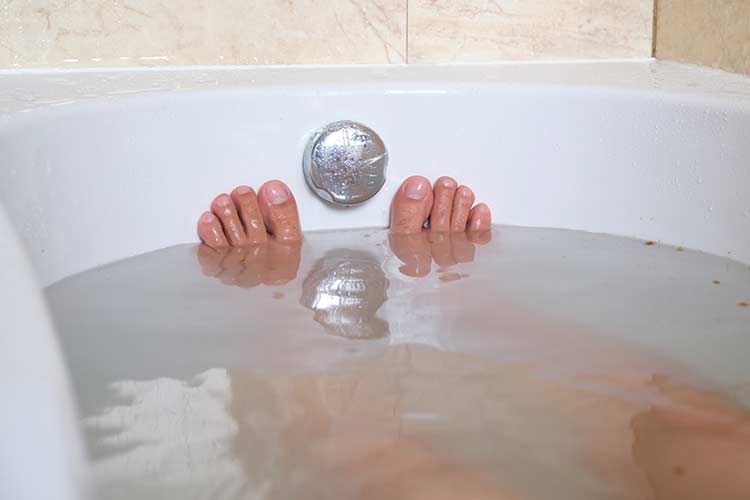Join Our eNewsletter!
Subscribe to our monthly newsletter to receive encouraging advice to help you lead a healthy lifestyle.

Soak Up the Possible Benefits of Epsom Salt
Chances are you’ve heard of Epsom salt, but you may not be completely sure what it is or what it’s used for. Despite its name and its resemblance to table salt, Epsom salt has a completely different chemical compound that you wouldn’t want to sprinkle on food. Also known as magnesium sulfate, Epsom salt is made up of magnesium, sulfur, and oxygen. And for hundreds of years, it’s been used to treat multiple ailments, most often by adding it to a bath of warm water and soaking in it. But are the supposed benefits of Epsom salt valid?

There’s been very little scientific research done on Epsom salt, so claims about its healing properties are mostly subjective. But, since soaking in Epsom salt is generally safe, there’s very little danger, if any, in trying this home remedy.
It’s important to note that Epsom salt should never be consumed without specific instruction by a physician because of the possibility of overdosing on magnesium, which could result in a potentially fatal electrolyte disorder called hypermagnesemia.

Epsom Salt Uses and Possible Benefits
The most common use of Epsom salt is to add 1 or 2 cups of it to a bathtub of warm water and soak for at least 15 minutes. The idea is that when the salt dissolves, it allows the magnesium in the salt to be absorbed by your body. However, there’s no definitive proof that magnesium can be absorbed through the skin. Still, many people swear by the benefits of an Epsom salt soak for the following uses:
- Reducing muscle pain and inflammation – Epsom salt may help reduce muscle soreness because magnesium helps decrease lactic acid buildup in the muscles. Many people who have inflammatory conditions, such as fibromyalgia and arthritis, are deficient in magnesium, which is why soaking in Epsom salt may be beneficial to them.
- Lowering stress and improving sleep – Low magnesium levels have been linked to insomnia, poor sleep, restless-leg syndrome, and a heightened stress response. Soaking in Epsom salt may help the body absorb more magnesium, resulting in improved sleep quality, a more relaxed mood, and lower anxiety and stress levels.
- Relieving mild sunburn and healing minor wounds – Soaking in Epsom salt may help alleviate the discomfort of mild sunburn and minor wounds, such as paper cuts and ingrown toenails, because of the inflammation-reducing properties of magnesium. However, you should not submerge in an Epsom salt bath if you have severe skin inflammation, a skin infection, or open wounds.
Although in most cases there’s no danger in soaking in an Epsom salt bath, if you experience itchy skin, an allergic reaction such as hives or rash, or a skin infection after doing so, you should immediately stop using Epsom salt.
While Epsom salt may be beneficial for some issues, its healing properties aren’t scientifically proven. If you believe you may have low magnesium levels, talk to your doctor about how to get enough magnesium through your diet and supplements.
Meet Our Team
Our Family Medicine doctors provide services for adults and children at several Kelsey-Seybold Clinic locations throughout the Houston area, so you’re never far from the compassionate care you need.








